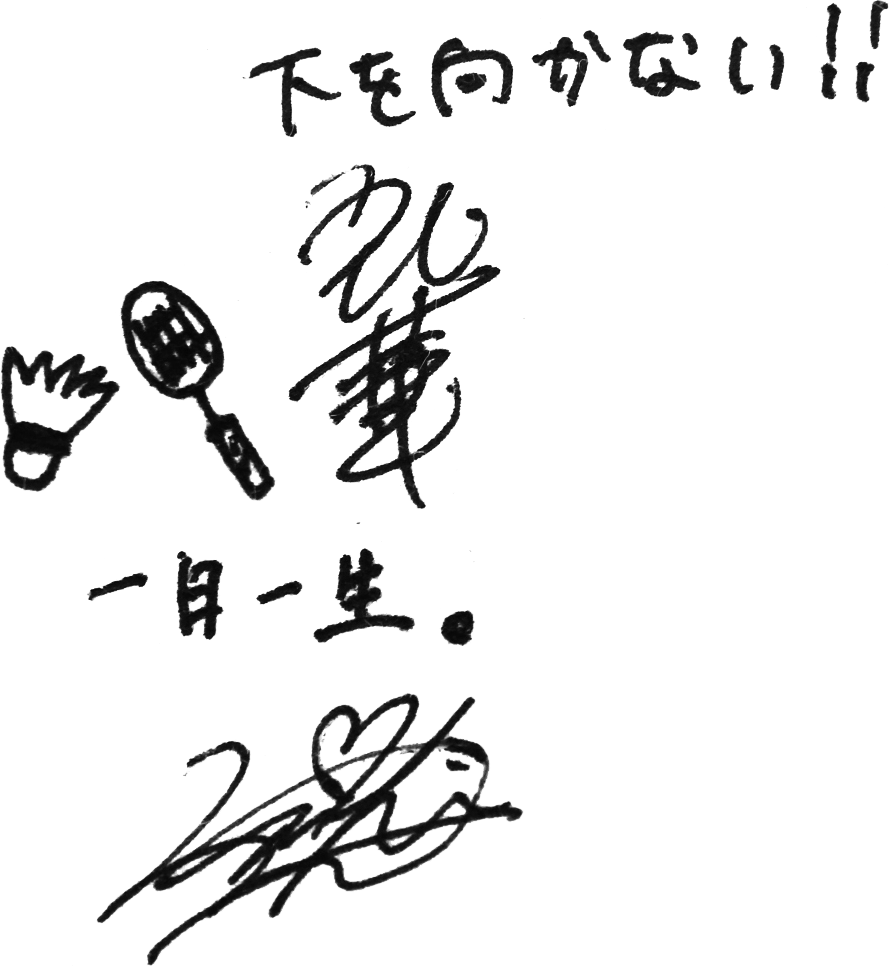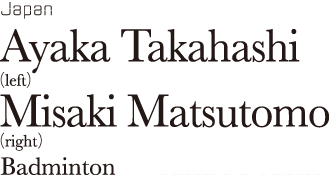




© Keita Yasukawa

Takahashi (T): It’s been about six months since we got our gold medal in the Rio de Janeiro 2016 Olympic Games. When I look back at that experience with a cooler head, I’m really glad that I stuck at it with persistence and never gave up.
Matsutomo (M): Me, too. Our victory in the final game was the crowning moment when I felt that all the years of hard work had finally been rewarded.
T: Ever since I was in elementary school, I devoted myself solely to playing badminton. I went through many difficult periods, such as living away from home. I lived in a dorm for six years—from the moment I started junior high school until I graduated from high school. But I got through them by telling myself that I had to persevere in order to shine one day as an athlete. A strong spirit of persistence and perseverance is an asset that I was able to cultivate through sport.
M: : I had always tried not to forget to be grateful as I dedicated myself to badminton. Receiving such warm support and winning a gold medal at the Olympics, and being congratulated by so many people made me think again about how important it is to remain grateful. I feel gratitude toward my parents, my doubles partner Ms. Takahashi, my many teammates and coaches who have been a part of my life as a badminton player, and even the rivals with whom I’ve competed in Japan and abroad. I have received the support of a countless number of people. My life to now was made possible with the help of other people. Whether it was continuing to play badminton, participating in the Olympics or winning a gold medal, nothing was achieved on my own without the support of others.
T: Without forgetting the feeling of gratitude, I feel that going forward, I must now live with not only an awareness as a badminton player but also as an Olympic gold medallist. What’s more, we were named Integrity Ambassadors* by the Badminton World Federation (BWF) in December 2016. Once we enter a badminton court, our only focus as an athlete is to play our style of badminton, so nothing changes there even with the appointment as Integrity Ambassadors. However, we now feel that we must further strengthen our awareness as disciplined, clean athletes. I think that it is not just a matter of playing fair ourselves. I hope that we can create a mood that every single one of us will aim to play fair in sport.
M: For both athletes and those who enjoy watching sport, I think everything boils down to being able to enjoy serious matches in which the players involved give their utmost. If any unfairness takes place, we lose the most important aspect of sport. I feel a sense of responsibility that I must serve as a role model—not just when I’m playing badminton but even when I’m off the court.
* BWF Integrity Ambassadors:
Athletes selected by the Badminton World Federation (BWF) to serve as role models as a part of their campaign to promote the value of “clean sport” and “fair play”.
[For more details, visit: http://bwfcorporate.com/integrity/integrity-ambassadors/]


© Nihon Unisys.,Ltd



T: I first met Ms. Matsutomo when we were in elementary school. We were both playing at the top of our respective grades. Since I was one grade higher, we never had a chance to play against each other in a tournament or other competitions. To tell you the truth, I didn’t really want to play against her because I didn’t want to lose to a younger player.
M: It was the other way around for me. I admired Ms. Takahashi as an exceptionally strong player, who was a grade ahead of me, and I wanted a chance to challenge her. The thing is, when that dream finally came true and I finally played against her, I was no match for her at all.
T: Later, we went on to the same high school, became teammates, and started playing doubles as a pair. When I was a senior in high school, we rose as high as the semi-finals in the Women’s Doubles at the ALL JAPAN Badminton Championships. We gained a lot of confidence by that achievement—of being high school students who were among the top four doubles pairs in our event in the championships. Thanks to that experience, we started placing the Olympic Games in our view. It changed our mindset to aspire to play badminton at an even higher level, so that’s a competition that we’ll never forget.
M: For me, those championships were also the biggest turning point of my competitive career as a badminton player. I hadn’t thought that we’d be able to get that far, so it was a highly memorable tournament. It was one in which we were able to discover new things about ourselves and find our future potential.
T: Since then, we’ve been working hard as a doubles pair. Before that, I was a good singles player. It was only after I started playing as a pair with Ms. Matsutomo that I discovered the joy of playing doubles. I feel grateful for her presence because there is much to learn from how she constantly spares no effort. I have also been able to overcome hardships and difficulties because she was there with me.
M: I think that Ms. Takahashi’s mental toughness and innate talent are really amazing. I am always inspired by her mental toughness and attitude. I am very lucky to have someone like her, whom I respect as a doubles partner, because I believe that I can achieve something if we do it together and support each other—even those things that I would otherwise not be able to achieve on my own.
T: Badminton taught me to feel concern for my partner even while maintaining a strong sense of self. Meeting someone whom I can trust and respect as a doubles partner, and raising our respective abilities into those of athletes who can compete on the world stage… it’s been a pearl beyond price.

© The Asahi Shimbun
T: The final match of the Badminton Asia Championships held before the Rio 2016 Olympic Games was played against another Japanese doubles pair. We had already secured a slot in the Olympic Games. If we lost that match, there was a chance that our opponent, who were also from Japan, would be able to qualify for the Games due to a rise in their world ranking. To be honest, I experienced a complicated feeling. But, I thought it would be “rude” to our opponent if we didn’t play seriously against them. So, we gave it our best, and we won the title in our event.
M: I think that in terms of sportspersonship it's important to play one’s very best at all times.
T: Even after we were ranked No. 1 in the world in 2014, we went through difficult periods when we couldn’t win at all. So, I was, of course, aware that it wouldn’t be easy to win a medal at the Olympics.
M: I think the reason why we were able to win the gold medal was that we never wavered from our goal of becoming a doubles pair who could win on the global stage.
T: That aside, I felt a little confused by the dramatic change that took place in our surrounding environment when we first returned from Brazil. In fact, I started to live with a strong awareness that we would always be watched by others. So, I started to become more careful than ever of even small things in everyday life, like my behaviour when riding the train.
M: Since becoming a gold medallist, the number of our supporters has increased tremendously. People greet me even when I'm just walking down the street. I spend my days with an even greater consciousness of the social conventions that need to be followed.
T: I think the excitement surrounding us has cooled off a bit now. I've also gotten used to being continually watched by others. My sense of responsibility and self-awareness as an Olympic gold medallist and as a BWF Integrity Ambassador are now growing. This is in terms of playing badminton in a way that meets people’s expectations as well as in living amidst such expectations.


© Keita Yasukawa
M: My aspirations as a badminton player might have been a bit different if the next Olympic Games weren’t going to be held in Tokyo. I experienced the magnificence of the Olympics in Rio de Janeiro. Therefore, just thinking that such wonderful Games will be held in my home country is enough to motivate me.
T: In terms of being motivated for what comes next, it was a bit different for me. After achieving the goal of winning a gold medal, I felt lost for a while. I didn’t know what my next goal was going to be. It was when I read an interview with an athlete that I saw a casual remark: “I'm not particular about the Olympic host city.” That made me suddenly realise that I was otherwise—that it was important to me that the Olympics were going to be held in Tokyo. At that moment, the vague notion of “retiring from the game,” which had been at the back of my mind, vanished. I'm the type of person who immediately translates thought into action. That’s why once my goal—to win another gold medal, this time in Tokyo—became clear to me, I immediately resumed training.
At the London 2012 Olympics, Ms. Zhao Yunlei of China won gold medals in the women's doubles and mixed doubles. I’ve always admired her and I'd like to perfect a style of playing badminton like her. I want to be good as both a front- and back-court player and exhibit strength no matter who I’m paired with. Unfortunately, she retired and we can no longer compete against her. However, I've learnt a lot from our past matches with her. I'd like to make good use of it and do my best.
M: I'm happy that Ms. Takahashi and I are sharing the same goal again. I also know that we will have to work even harder to achieve that goal. It's very difficult to keep on winning on the global stage. There will be times when we win and times when we feel the frustration of losing. We hope to become an even stronger doubles pair by 2020. We will even make any losses we experience a means to spurt our growth. We want to get as close to possible to playing an ideal style of badminton like that of the badminton players whom we respect.

© Keita Yasukawa
T: Badminton has been my life ever since I was a small child. Now that I’ve made up my mind to go to Tokyo 2020, this lifestyle won't change significantly. However, I'd like to try as many different things as possible. For example, when I think about what I’ll do after retiring as an athlete, I can hardly imagine myself staying put in the world of badminton. That means I have to become a person who can adapt widely to society.
M: I cherish the words “Live life to the fullest every day.” These are words that I found on the Internet a few years ago. To me, it means that we shouldn’t waste any moment in our life, and we should treasure each day that we live. I encountered the phrase when we were working hard toward the Olympic Games, so I found it very easy to take in. I want to value each day that I live and continue growing, both as an athlete and as a person.
T: What I always keep in mind is to never become discouraged. Even if something unpleasant occurs, I try to think positively—nothing good would come of becoming discouraged. That’s why I want to show as many people as possible through our positive, spirited badminton style that something good might come about if you persist without giving up.
M: And, as BWF Integrity Ambassadors, we'd like to be athletes who convey the joy of badminton not only to Japan but also to the whole world. At the same time, we hope to be a good role model, exemplifying an attitude of working hard while embracing the value of feeling gratitude.




Takahashi started competition badminton at a local club in elementary school first grade. Matsutomo started badminton with a local boys' group at the age of five.
In 2007, one of them was one grade older, but they made a pair and played a match together. In the ALL JAPAN Badminton Championships Women's Doubles of the following year, they continued to advance and got into the best four.
After joining Nihon Unisys, Ltd. they were paired again, won various international conventions, and in 2014, were ranked No. 1 in the world. At the Rio de Janeiro 2016 Olympic Games, they won a gold medal with a dramatic comeback victory.
In December 2016, the two were appointed as BWF Integrity Ambassadors.